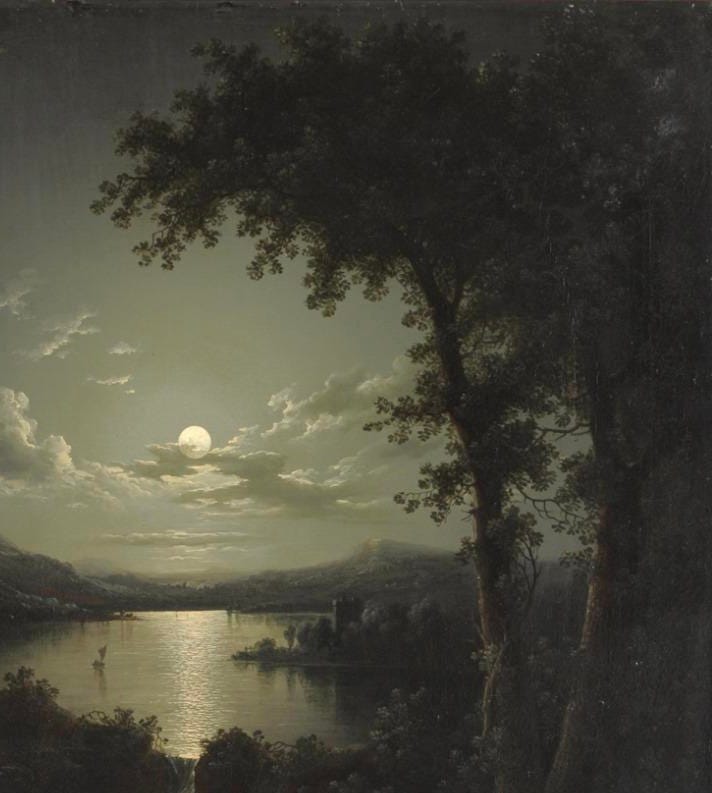Moonlight
The water seemed as insubstantial as the moonlight that played upon it. Herb took long, languid strokes. When he lifted the oars, silver droplets fell from the blades, leaving silver circles on the surface, circles that widened in the wake of the little boat. The boat glided on, as easily as if it were floating above the lake, through the clear air of the Whatsit Valley. … Herb was rowing toward the future; the past was in their wake.
Herb ’n’ Lorna, Chapter 7
Fire: As a Metaphor for Passion
Passion: Fire as a Metaphor for
Lorna lifted herself on one elbow and looked back toward the ballroom. It was in flames. They hurried into their clothes and began rowing back, sitting side by side, pulling at the oars, keeping their course by keeping their fire-formed shadows in the boat, and Lorna, who was so giddy with the promise of the future they had tasted that she couldn’t resist her happiness, even though she worried about the fire, turned toward Herb and asked, “You don’t think we did it, do you?”
Herb ’n’ Lorna, Chapter 7
This passion of which we speak, though it begin with the young, yet forsakes not the old, or rather suffers no one who is truly its servant to grow old, but makes the aged participators of it, not less than the tender maiden, though in a different and nobler sort. For it is a fire that, kindling its first embers in the narrow nook of a private bosom, caught from a wandering spark out of another private heart, glows and enlarges until it warms and beams upon multitudes of men and women, upon the universal heart of all, and so lights up the whole world and all nature with its generous flames. It matters not, therefore, whether we attempt to describe the passion at twenty, at thirty, or at eighty years. He who paints it at the first period will lose some of its later, he who paints it at the last, some of its earlier traits. Only it is to be hoped that, by patience and the Muses’ aid, we may attain to that inward view of the law, which shall describe a truth ever young and beautiful, so central that it shall commend itself to the eye, at whatever angle beholden.
Ralph Waldo Emerson, “Love”
This paper discusses the role of metaphor in describing intense romantic feelings relating to love, lust and desire in American fiction. I propose that ‘passion’ integrates notions of romantic love with the related ideas of ‘lust’ and ‘desire’. Using the fiction section of the Corpus of Contemporary American English I offer empirical evidence that fictional accounts of intense romantic feelings are characterised by two related types of metaphor: those based on the experience of heat and fire, and those based on the experience of physical or natural forces. … These metaphors are employed to understand various aspects of romance feelings including their cause, their effect and the level of intensity with which they are experienced by fictional characters. I explain how fire and heat are related through metonymy and how these are both related to fire through the force dynamic model (originally proposed by Talmy 1988 and developed in Kovecses 2000) to account for fictional representations of the passions, especially as regards variations in their intensity. …
J. Charteris-Black, “All-consuming passions: Fire metaphors in fiction,” in Semantic Scholar
See also: Moonlight TG 39; Moon: Daytime Illusion of Transparency TG 79
[more to come on Monday, July 11, 2022]
Have you missed an episode or two or several?
You can begin reading at the beginning or you can catch up by visiting the archive or consulting the index to the Topical Guide.
You can listen to the episodes on the Personal History podcast. Begin at the beginning or scroll through the episodes to find what you’ve missed.
You can ensure that you never miss a future issue by getting a free subscription. (You can help support the work by choosing a paid subscription instead.)
At Apple Books you can download free eBooks of “My Mother Takes a Tumble,” “Do Clams Bite?,” “Life on the Bolotomy,” “The Static of the Spheres,” “The Fox and the Clam,” “The Girl with the White Fur Muff,” “Take the Long Way Home,” “Call Me Larry,” and “The Young Tars,” the nine novellas in Little Follies, and Little Follies itself, which will give you all the novellas in one handy package.
You’ll find an overview of the entire work in An Introduction to The Personal History, Adventures, Experiences & Observations of Peter Leroy. It’s a pdf document.



